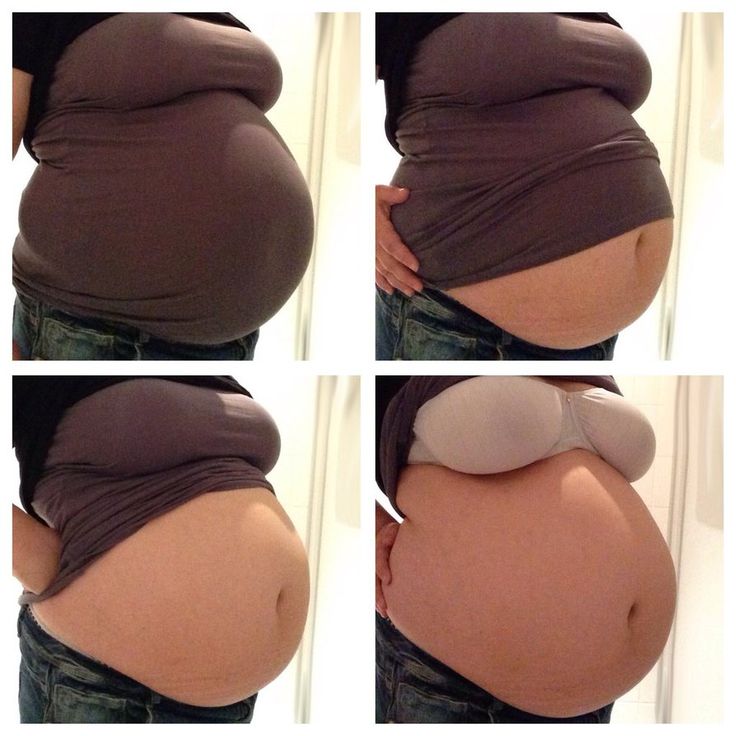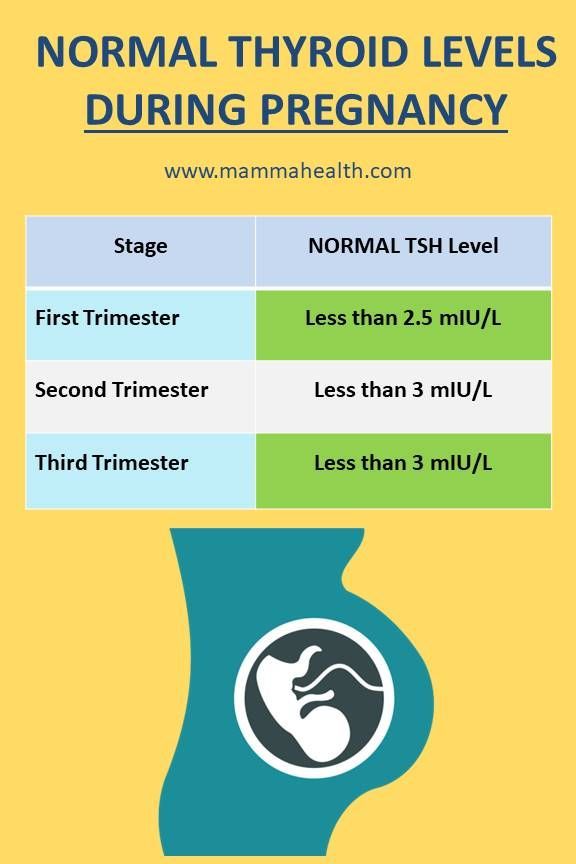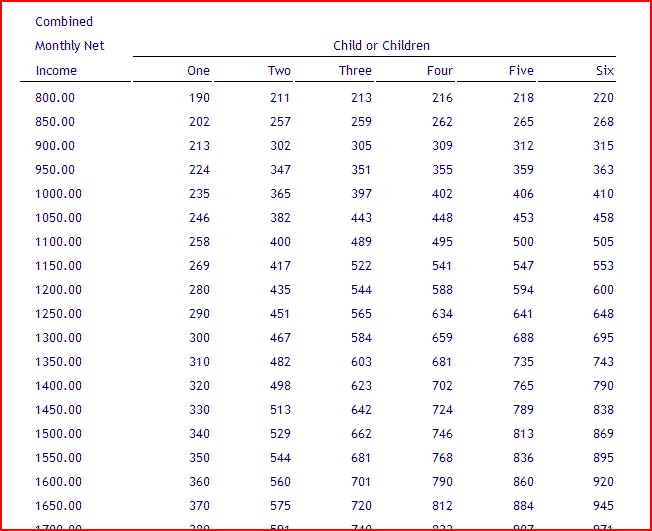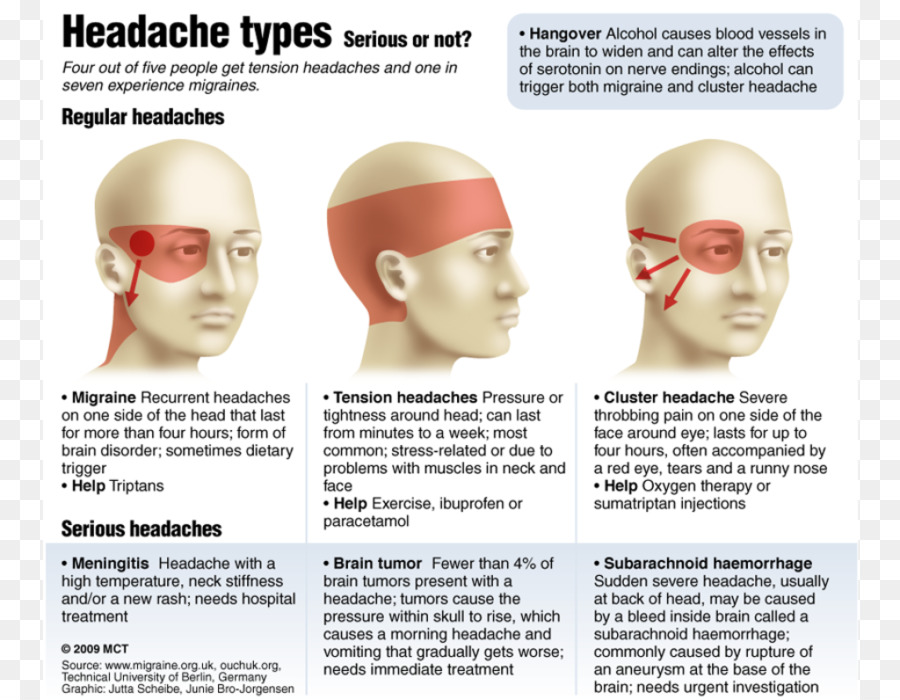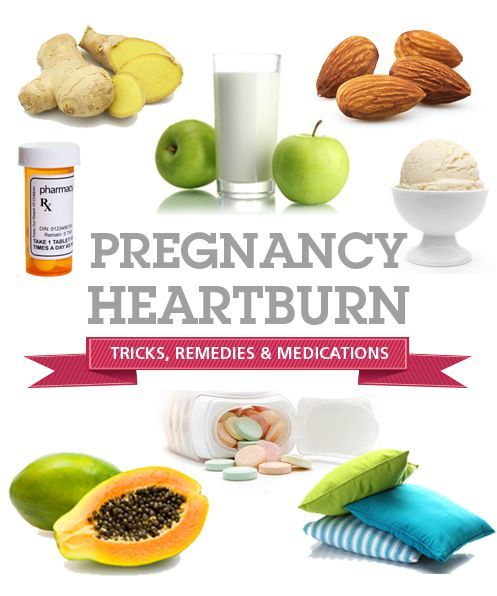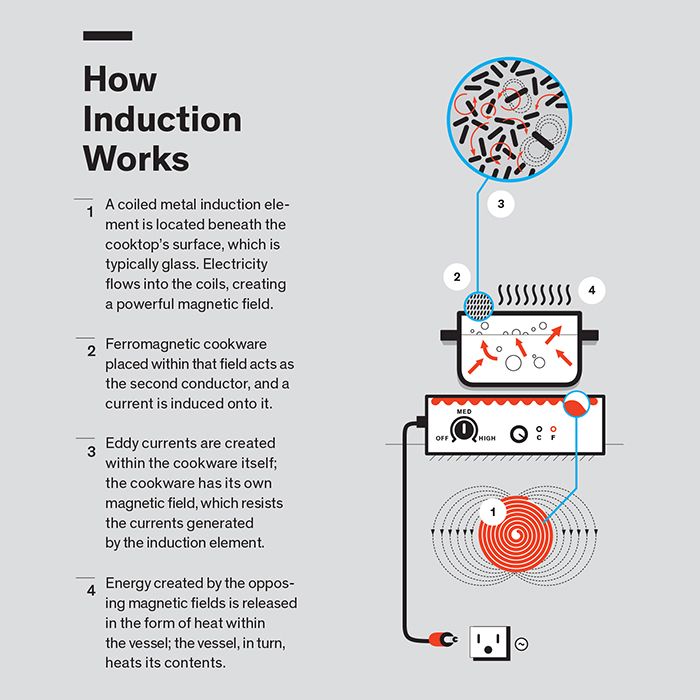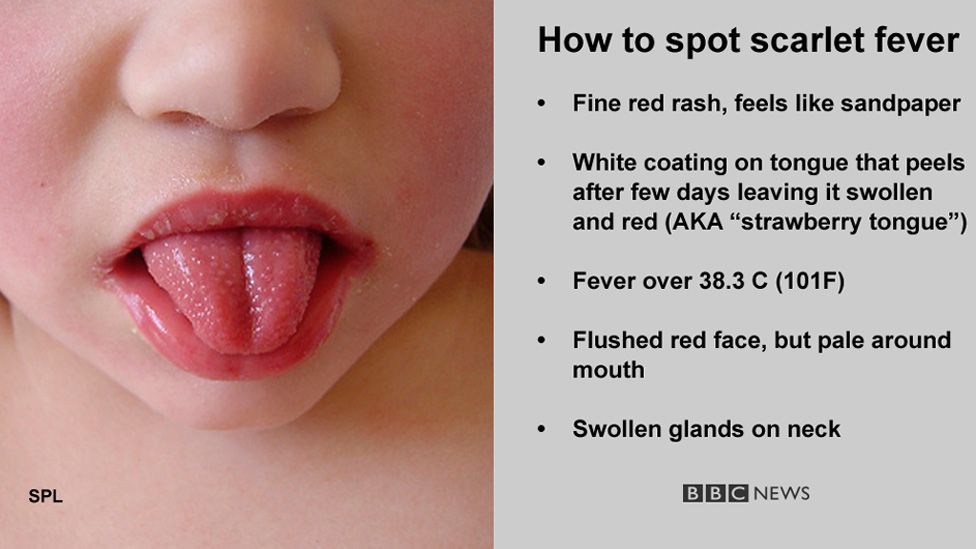Morning sickness feels like
What does morning sickness feel like?
3-minute read
Pregnancy can be a happy and exciting time, but it can also cause discomfort. If your pregnancy has you feeling nauseous and running to the bathroom, you're not alone. About 80% of pregnant women experience nausea or morning sickness. An early symptom of pregnancy, morning sickness usually begins in the first trimester and, for most women, tapers off within weeks. But what does morning sickness feel like, and what can you do about it?
Morning sickness is a term to describe nausea and vomiting that commonly occurs during pregnancy. For many women, morning sickness starts around the sixth week of pregnancy. The condition usually fades or lessens after 14 weeks, but some women experience it throughout their pregnancy, especially if they're pregnant with multiples.
Although
it may be termed "morning sickness," nausea and vomiting can happen at any time
or even all day. It also affects woman differently. Some women may feel
nauseous for a certain period of the day and vomit once or twice. Others feel
nauseous all day.
The exact cause of morning sickness isn't fully understood. According to the National Library of Medicine, some experts point to the fluctuation in a woman's hormones during pregnancy or low blood sugar levels that often occur in early pregnancy.
Different triggers can lead to morning sickness. Strong smells, certain foods, and food textures can make you feel queasy. Feeling too full, hungry, or warm can make you nauseous. You may feel sick in between or right before meals.
Will morning sickness hurt me or my baby?Morning sickness can be very uncomfortable, sidelining you from activities you love, but it will not cause serious health problems for you or your baby. However, you can get dehydrated if you vomit too much, so watch out for these warning signs of dehydration:
- A racing heartbeat
- Dark-colored urine
- Feeling lightheaded or dizzy
- Inability to keep down liquids
Some women
may experience a more intense, longer-lasting form of morning sickness called
hyperemesis gravidarum.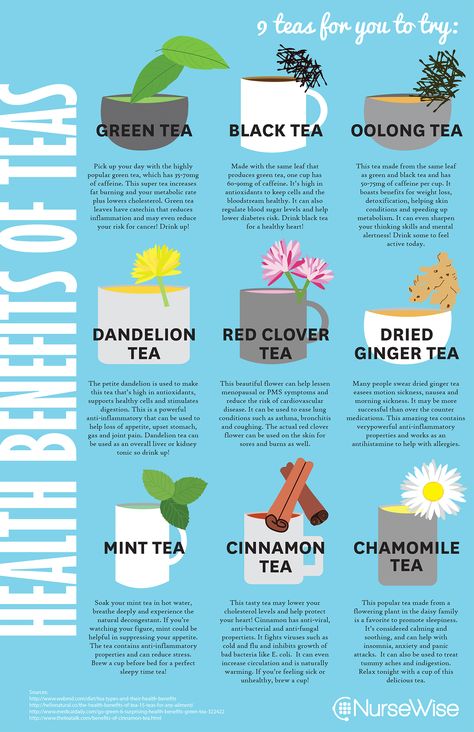 It has the same symptoms as morning sickness, only more
severe, and can require hospitalization in extreme cases.
It has the same symptoms as morning sickness, only more
severe, and can require hospitalization in extreme cases.
Your OB/GYN is the best source of support if you're experiencing morning sickness. Women who experience excessive dehydration or hyperemesis gravidarum may need to receive IV fluids. Your healthcare provider is the best point of contact and support if you're experiencing severe and persistent nausea and vomiting.
How to manage morning sicknessIf you're dealing with morning sickness, sticking to a healthy pregnancy diet may help to relieve nausea and vomiting. Consider the following tips:
- Opt for small, frequent snacks every one to two hours instead of eating big meals.
- Try bland, easily digestible foods, such as plain crackers and broth.
- Have a small snack before you feel
hungry to avoid nausea. Some women have crackers by their bedside to eat before
getting up in the morning when their nausea is often worse.
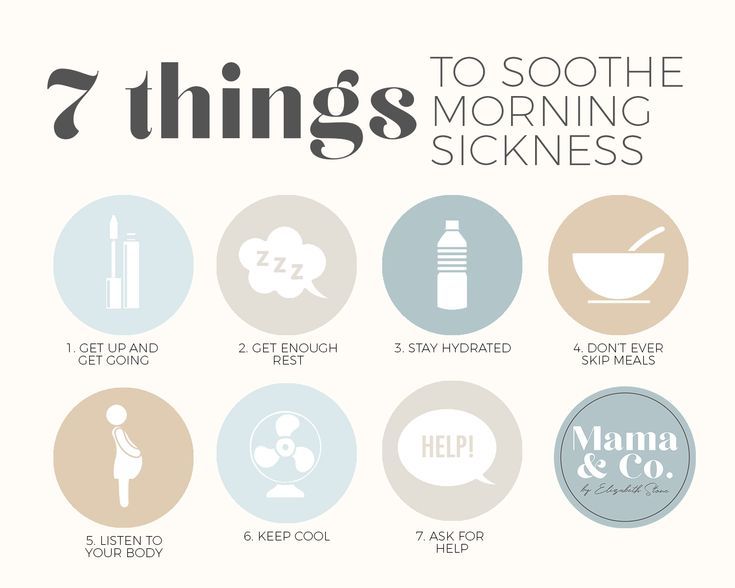
- Combine high-protein foods with carbohydrates. Cheese and crackers, peanut butter on apples or bananas, and nuts may prevent nausea. Keep trying different foods to see what you can tolerate. The goal is to keep food and liquids down as much as possible.
- Avoid spicy, fried, and fatty foods, which digest slowly.
- Ginger may help soothe the stomach. Try it in tea, chews, or carbonated drinks, such as ginger ale.
- Stay hydrated. Drink plenty of water. If you vomit, try sports drinks or another oral rehydration solution.
- Alter your daily routine or activities when feeling woozy, which may mean taking it easy in the morning and choosing exercises you can tolerate, such as yoga.
- Avoid known triggers, such as strong smells.
- Get plenty of rest and take steps to minimize stress.
If you
can't keep fluids down or maintain an appropriate weight, your OB/GYN may
recommend a special supplement to help manage nausea and vomiting. You also
might try changing your prenatal supplement to another brand or taking it at a
different time of day.
You also
might try changing your prenatal supplement to another brand or taking it at a
different time of day.
Over-the-counter medications that combine vitamin B6 and an antihistamine may also help. These medications are often used to treat motion sickness and can safely ease nausea. Talk with your healthcare provider about how and when to take anti-nausea medications.
When these treatments don't work, your OB/GYN may recommend prescription medications to manage nausea and vomiting. Certain medications have risks, so it's important to talk with your provider and weigh the risks with the potential benefits.
Find an OB/GYN you can trust for all your prenatal care at Reid Health.
What Morning Sickness Really Feels Like
You know what they never taught us about in sex ed? Morning sickness. And as someone who wants to have kids one day, I would like some answers.
Sure, I sort of know what it is (there's puking involved, yes?), but why does morning sickness happen? Does random nausea mean you might be pregnant? Is there any way to prevent morning sickness (🙏)? These are the questions that keep me up at night.
And whether you're currently pregnant or think you might want to be eventually, I'm gonna go ahead and bet you have some of the same Qs. Don't worry, I'm here to help help. But as a person with no medical degree who's never experienced morning sickness herself, here's where I call in backup (aka, four ob-gyns).
First, let's define morning sickness. "Many women, I can't say all women, but many women get nauseous during pregnancy," explains Mary Jane Minkin, MD, clinical professor in the Department of Obstetrics, Gynecology, and Reproductive Sciences at the Yale University School of Medicine. "It's called morning sickness because many people experience nausea and vomiting in the morning, however, there are many women who experience these symptoms throughout the day," adds Heather Irobunda, MD, an ob-gyn based in Queens, New York.
Ok, now that we've got the basics down (morning sickness = nausea and vomiting during pregnancy and it doesn't just happen in the morning) let's get down to the nitty gritty of why it happens, what it feels like, and what you can do about it.
Below, find literally everything you could ever want to know about morning sickness.
What causes morning sickness?
Short answer: Experts don't totally know. "No one really knows the exact mechanism of nausea, but we do think that it's partly because of the hormonal changes—mostly beta human chorionic gonadotropin (hCG), which is the baby hormone that's produced in very high amounts," says Sherry A. Ross, MD, women's health expert and author of She-ology and She-ology, the She-quel: Let's Continue the Conversation. Doctors think higher levels of hormone are responsible for morning sickness because women who have higher levels of hCG, like those who are pregnant with twins, tend to experience more nausea.
It could also have to do with the increased production of the hormone progesterone, says Dr. Irobunda. "The extra progesterone may cause your gastrointestinal (GI) tract to slow down, causing food to sit in your stomach longer than normal which can give you a nauseous feeling," she says.
As for why morning sickness usually happens in the morning, experts think it's because some women's symptoms worsen when they have an empty stomach, Dr. Irobunda says. That's why some docs recommend patients with morning sickness eat something small before getting out of bed, adds Dr. Ross.
What does morning sickness feel like?
Welp, it kinda sucks. It ranges from a mild queasy feeling to the more extreme kind of nausea that you feel when you have the stomach bug, says Dr. Minkin. If you're in the unlucky group, it can be "10 to 12 weeks of feeling exhausted and miserable from being on the verge of throwing up 24/7," says Dr. Ross. Ugh.
Ross. Ugh.
Either way, you'll probably be more sensitive to smells that have never bothered you before. According to Dr. Ross, everything from the smell of coffee brewing in the morning to your partner's body wash can send you running to the toilet. Yikes.
Is morning sickness a good sign?
It definitely can be! Dr. Ross tells her patients that morning sickness is a great first sign of pregnancy. "When people have nausea I'm always like 'ah, I'm so happy for you' because it's a good sign that things are going in the right direction," she says. In other words, it means your body is producing the hormones it should be.
But don't freak if you don't have it. If you're not nauseous, it doesn't necessarily mean that anything is wrong, says Dr. Minkin. It just means you're lucky.
First Response Early Result Pregnancy Test, 3 Pack
First Response Early Result Pregnancy Test, 3 Pack
Now 34% Off
$13 at Amazon
And if you have random nausea, it doesn't automatically mean you're pregnant. If you think you might be, pick up a First Response home pregnancy test kit, says Dr. Minkin. She recommends this one because it's most accurate and can pick up on tiny levels of hCG before you even miss your period.
If you think you might be, pick up a First Response home pregnancy test kit, says Dr. Minkin. She recommends this one because it's most accurate and can pick up on tiny levels of hCG before you even miss your period.
When is morning sickness the worst?
Good news: Morning sickness doesn't last through the entire nine months of pregnancy (phew). In fact, it tends to be the worst during the first eight weeks, says Dr. Ross. It should stop by the end of the first trimester, so around 13 weeks.
But, FWIW, some women do experience morning sickness all the way until 20 weeks, or halfway through the pregnancy, says Dr. Minkin. And in some super rare cases, it can last throughout the whole pregnancy, says Jackie Walters, MD, an Atlanta-based ob-gyn and author of The Queen V: Everything You Need to Know About Sex, Intimacy and Down There Care. In that case, you'll definitely want to talk to your gyno about ways to manage it. Speaking of which...
Speaking of which...
Is there anything you can do about morning sickness?
Yup. Thankfully there are a ton of ways to relieve morning sickness. From eating strategies to natural remedies to prescriptions, here's what the experts recommend.
Eat bland foods
Premium Saltine Crackers
Premium Saltine Crackers
$11 at Amazon
Stick to the BRAT diet (that's bananas, rice, applesauce, and toast), suggests Dr. Ross. These foods and other blah, easy-to-digest foods like crackers and clear soups are less likely to upset your stomach and trigger morning sickness symptoms.
Have small, frequent meals
As I mentioned earlier, morning sickness can be worst when you have an empty stomach. By eating small, frequent meals, you'll always have a little something in your stomach so the whole empty stomach thing never comes into play. Plus, it's easier on the digestive system, says Dr. Irobunda.
Plus, it's easier on the digestive system, says Dr. Irobunda.
Eat and drink separately
If you find that sipping on a bev while you're eating makes you feel queasy, try eating and drinking separately, says Dr. Irobunda. Doctors aren't totally sure why it works, but it seems to help.
Stick with foods that sound good to you
Craving chocolate cake? Eat it for three meals a day if you want. It's way more important to focus on getting enough calories in vs. nutrition during this time says Dr. Minkin. Your prenatal vitamin will ensure that the baby is getting the right nutrients, so just focus on eating meals that sound good to you.
Keep a food journal
It helps to learn what foods and smells agree with you—and which ones definitely don't. Keep a notebook in your kitchen or purse and jot down what makes you feel like you're gonna hurl so that you can avoid those things accordingly, suggests Dr. Ross.
Ross.
Tummy Drops Natural Ginger Lozenges
Tummy Drops Natural Ginger Lozenges
Now 28% Off
$13 at Amazon
Try ginger
Ginger is thought to help by relaxing the GI muscles associated with morning sickness, explains Dr. Ross. You can drink it in a tea, pop a ginger capsule, suck on a ginger lozenge, sip a non-alcoholic ginger beer, the world is your oyster.
Take some vitamin B6
Solgar Vitamin B6, 100 Tablets
Solgar Vitamin B6, 100 Tablets
$8 at Amazon
Taking 25 milligrams of vitamin B6 three times a day is a game-changer for some women, says Dr. Ross. This is another case where gynos aren't really sure why it works, they just see clear results. If taking it orally doesn't help, you can also ask your ob-gyn about getting a dose of vitamin B6 through an IV once or twice a week, says Dr. Minkin. She's had patients swear by it.
Consider taking a prescription
If you've tried all of the remedies above and you're still puking your guts out, talk to your doctor. There are prescription medications, like the mega popular Diclegis—which is a combination of vitamin B6 and an antihistamine—that can help you feel better, says Dr. Minkin.
Why do you feel sick in the morning on an empty stomach
Nausea in the morning on an empty stomach is most common in pregnant women due to intoxication, but it is not uncommon for males or even children to have this problem
Do not worry too much if you have encountered such a problem once, it is likely that this is a banal poisoning. But, if nausea in the morning on an empty stomach does not go away, you should immediately consult a doctor. Some people are used to dealing with this problem with folk remedies and medicines and they really get better, but it is worth considering that most likely the disease or pathology itself continues to develop. And as a result, it will turn into a more serious form. That is why it is so important to consult a doctor who will find out the cause of morning sickness and prescribe the most effective treatment. nine0004
And as a result, it will turn into a more serious form. That is why it is so important to consult a doctor who will find out the cause of morning sickness and prescribe the most effective treatment. nine0004
Possible diseases
Most often, morning sickness on an empty stomach may indicate the presence of the following diseases: unpleasant symptoms. This is due to inflammatory processes in the duodenum 12. The patient can also be tormented by: burning, bloating during and after eating, heartburn. nine0013 Inflammation of the pancreas (pancreatitis) - also characterized by nausea in the morning, as well as after eating fatty or fried foods. This disease is easily confused with gastritis due to the similarity of symptoms, but with pancreatitis, the patient begins to have problems with stools and an unpleasant, bitter taste in the mouth.
 Accompanying symptoms are pain in the right hypochondrium and excessive gas formation. nine0014
Accompanying symptoms are pain in the right hypochondrium and excessive gas formation. nine0014 Other causes of nausea in the morning
After excluding the above diseases from the list of causes, the following causes can be considered:
- Pregnancy. Intoxication and nausea in the morning is often found in pregnant women, especially in the early stages. This is a normal reaction of the body to significant changes and hormonal changes. It is very important to completely exclude drugs for the treatment of the digestive tract during pregnancy. These funds can have an extremely negative impact on the health of the patient, the unborn child and the course of pregnancy. Therefore, you will have to endure this ailment and get by with folk remedies, but be sure to consult your doctor. nine0014
- Migraine. Morning sickness on an empty stomach may precede a severe headache. You will most likely still feel a lot of noise and increased sensitivity to smells.
- High blood pressure (hypertension).
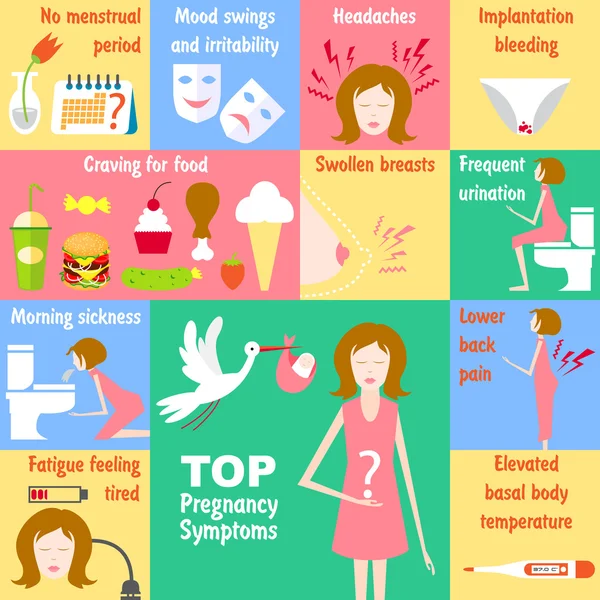 The problem of morning sickness can be accompanied by headache and dizziness. If you do not pay attention to these symptoms in a timely manner, you risk starting this disease, which in turn can lead to a stroke.
The problem of morning sickness can be accompanied by headache and dizziness. If you do not pay attention to these symptoms in a timely manner, you risk starting this disease, which in turn can lead to a stroke. - Cardiovascular disease - rarely, nausea on an empty stomach occurs with heart failure or developing myocardial infarction. If nausea is accompanied by pain, a feeling of heaviness and tightness behind the sternum, numbness or tingling in one half of the body, it is necessary to seek medical help as soon as possible, as this may be an incipient myocardial infarction. nine0014
- Increased intracranial pressure - Nausea and regurgitation in infants can occur when pressure increases inside the ventricles of the brain.
What to do if you feel sick in the morning
It is important to understand that regular morning sickness is a signal of the presence of a pathology or disease and it is highly undesirable to self-medicate. Be sure to consult a doctor for an examination, but if you don’t have such an opportunity at the moment, there are several effective ways that will help reduce or temporarily get rid of this problem:
- Medicines.
 You need to be very careful and you must be sure that morning sickness is not the cause of pregnancy or an intestinal disease.
You need to be very careful and you must be sure that morning sickness is not the cause of pregnancy or an intestinal disease. - Ginger root, mint and lemon drinks. You can make infusions of these products for maximum effect, simply by adding them to a glass and boiling water, after 15 minutes you will have a very effective and safe (in the absence of allergies) remedy for morning sickness. YOU can also just add them to hot tea. nine0014
- Medicinal collection - if nausea relentlessly torments you in the morning, you can try a collection of mint, oak bark and celandine. To prepare the drink, take 1 tsp of mint leaves, dried oak bark and chopped celandine, pour 0.5 l of boiling water and boil in a water bath for 10 minutes. After the broth is cooled and filtered, take 1 tablespoon 3-5 times a day before meals.
- During pregnancy. There are some little tricks you can use. For example, do not get out of bed quickly, drink plenty of fluids. Eliminate fatty and heavy foods from your diet.
 Eat small meals several times a day. nine0014
Eat small meals several times a day. nine0014
You might be interested
Tired of nausea in the morning? Constantly sick after eating? We understand the reasons!
- Why do you feel sick in the morning?
- Causes of nausea after eating
- How to determine the exact cause of nausea?
- What to do if the gastroenterologist did not reveal violations? nine0013 Treatment
Nausea, a feeling of heaviness in the stomach, heartburn are familiar to everyone. I overate on fatty delicacies at the festive table - unpleasant sensations will not be long in coming. I drank expired kefir or too much alcohol - nausea is right there. The reasons are simple and clear. In the first case, there were not enough enzymes to digest food, and the liver had to work at its limit. In the second, toxic substances entered the body, which caused poisoning. These symptoms are unpleasant, but they are temporary. And they usually go away after a few days or even hours. But what if you feel sick all the time? We need to figure out the reasons! nine0004
I overate on fatty delicacies at the festive table - unpleasant sensations will not be long in coming. I drank expired kefir or too much alcohol - nausea is right there. The reasons are simple and clear. In the first case, there were not enough enzymes to digest food, and the liver had to work at its limit. In the second, toxic substances entered the body, which caused poisoning. These symptoms are unpleasant, but they are temporary. And they usually go away after a few days or even hours. But what if you feel sick all the time? We need to figure out the reasons! nine0004
Why do you feel sick in the morning?
Waking up daily in the morning with a feeling of nausea, which causes you to refuse breakfast and take a long time to "come to yourself", may be associated with nocturnal gastroesophageal reflux (reflux of bile into the esophagus). By itself, it is not a pathology, since normally it occurs mainly after eating and does not cause discomfort. The body for its suppression includes compensatory antireflux mechanisms.
But if an unpleasant symptom is observed frequently and lasts for a long time, then we can talk about gastroesophageal reflux disease or diseases of the gastrointestinal tract. MRI of the abdominal cavity will help to find out the exact cause and make a diagnosis. nine0004
Causes of nausea after eating
Nausea after breakfast or lunch can be caused by heavy meals (mainly fatty), overeating, psychogenic eating disorders (anorexia, bulimia).
But in most cases, the patient's unpleasant condition is associated with pathologies of the gastrointestinal tract: gastritis, colitis, peptic ulcer, enteritis.
How to determine the exact cause of nausea?
The range of possible violations, as we see, is quite "rich". Nausea can be caused by the liver, gallbladder, biliary tract, pancreas, stomach, small intestine, duodenum, lower esophageal sphincter, and gastroesophageal junction. nine0004
Problems can cause inflammation, erosion, ulcers, cysts, tumors, gallstones.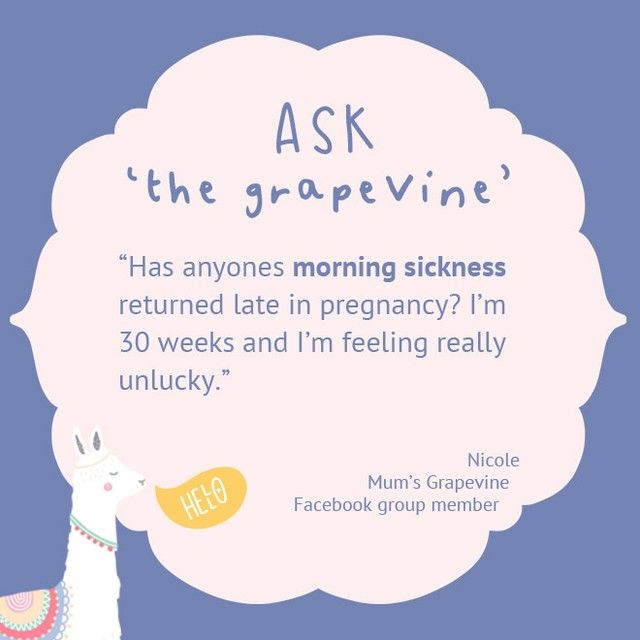 The cause may be stenosis (narrowing) of the output section of the stomach, fibrosis, cirrhosis and fatty degeneration of the liver (hepatosis). Often, patients are diagnosed with functional disorders.
The cause may be stenosis (narrowing) of the output section of the stomach, fibrosis, cirrhosis and fatty degeneration of the liver (hepatosis). Often, patients are diagnosed with functional disorders.
Abdominal MRI is recommended to determine the gastrointestinal cause of nausea and rule out a tumor causing dysphagia (food obstruction and stagnation).
A highly informative study allows the patient not to run around the doctors' offices, checking each organ separately. And immediately simulate a three-dimensional image of each organ, see its layered sections. And get an idea of the overall picture: the thickness and changes in the walls of the stomach, the state of the gallbladder, the size of the liver, pancreas, duodenum, esophagus, track their functions in real time. MRI provides better visualization of the gastrointestinal tract than CT, so this method is preferable in most cases. nine0004
Examination can be done without and with contrast. In the second case, the cost of abdominal MRI will be higher, but the study will provide more accurate information on tumor neoplasms.
What should I do if the gastroenterologist has not identified any abnormalities?
It also happens that after the examination, the gastroenterologist tells the patient that no pathologies have been detected on his part. However, such joyful news does not yet mean that the person who came with complaints is heroically healthy. nine0004
The etiopathogenesis of nausea may be associated with:
- vascular pathologies;
- hypertension;
- diseases of the inner ear;
- endocrine disorders;
- brain and CNS pathologies;
- head injuries and post-traumatic syndromes;
- viral, bacterial and parasitic infections (often not associated with the gastrointestinal tract, but affecting the lungs, ENT organs, CNS).
Treatment
Nausea is not a disease, but a symptom of some disorder or disease. Therefore, if it is not associated with toxic poisoning, then you need to look for and eliminate the cause, and not fight the effect.
